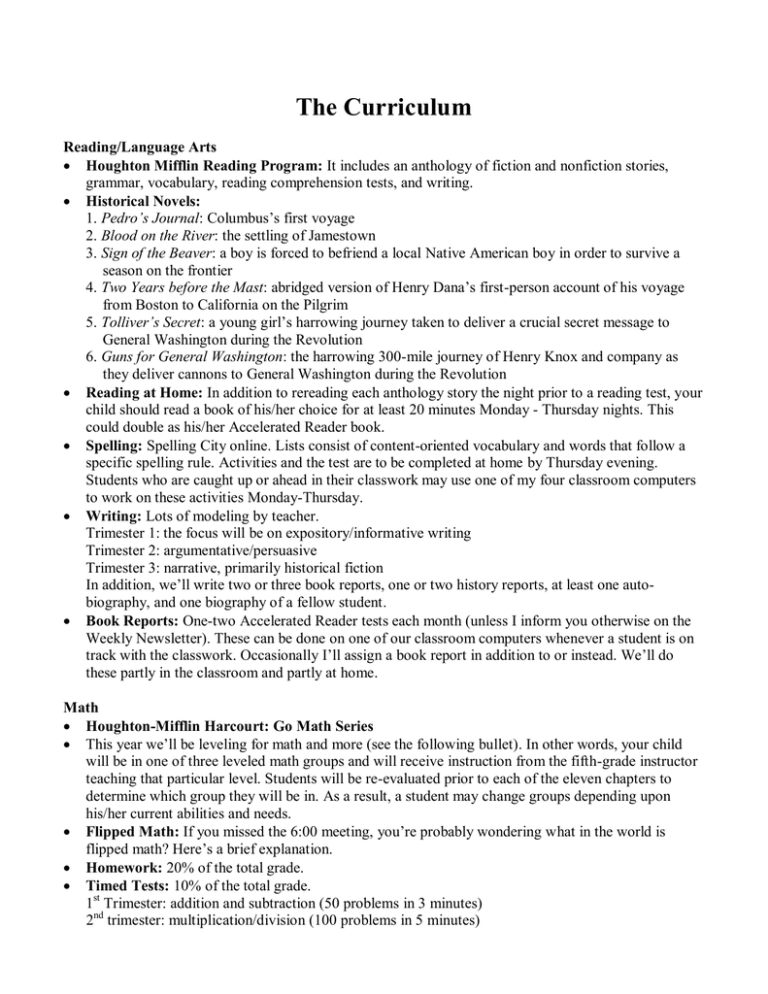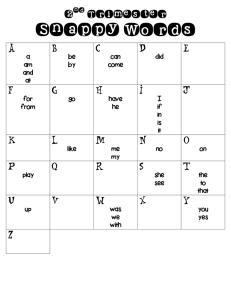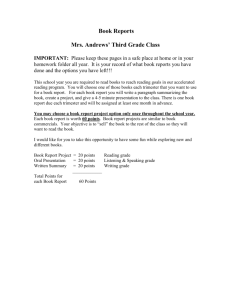The Curriculum
advertisement

The Curriculum Reading/Language Arts Houghton Mifflin Reading Program: It includes an anthology of fiction and nonfiction stories, grammar, vocabulary, reading comprehension tests, and writing. Historical Novels: 1. Pedro’s Journal: Columbus’s first voyage 2. Blood on the River: the settling of Jamestown 3. Sign of the Beaver: a boy is forced to befriend a local Native American boy in order to survive a season on the frontier 4. Two Years before the Mast: abridged version of Henry Dana’s first-person account of his voyage from Boston to California on the Pilgrim 5. Tolliver’s Secret: a young girl’s harrowing journey taken to deliver a crucial secret message to General Washington during the Revolution 6. Guns for General Washington: the harrowing 300-mile journey of Henry Knox and company as they deliver cannons to General Washington during the Revolution Reading at Home: In addition to rereading each anthology story the night prior to a reading test, your child should read a book of his/her choice for at least 20 minutes Monday - Thursday nights. This could double as his/her Accelerated Reader book. Spelling: Spelling City online. Lists consist of content-oriented vocabulary and words that follow a specific spelling rule. Activities and the test are to be completed at home by Thursday evening. Students who are caught up or ahead in their classwork may use one of my four classroom computers to work on these activities Monday-Thursday. Writing: Lots of modeling by teacher. Trimester 1: the focus will be on expository/informative writing Trimester 2: argumentative/persuasive Trimester 3: narrative, primarily historical fiction In addition, we’ll write two or three book reports, one or two history reports, at least one autobiography, and one biography of a fellow student. Book Reports: One-two Accelerated Reader tests each month (unless I inform you otherwise on the Weekly Newsletter). These can be done on one of our classroom computers whenever a student is on track with the classwork. Occasionally I’ll assign a book report in addition to or instead. We’ll do these partly in the classroom and partly at home. Math Houghton-Mifflin Harcourt: Go Math Series This year we’ll be leveling for math and more (see the following bullet). In other words, your child will be in one of three leveled math groups and will receive instruction from the fifth-grade instructor teaching that particular level. Students will be re-evaluated prior to each of the eleven chapters to determine which group they will be in. As a result, a student may change groups depending upon his/her current abilities and needs. Flipped Math: If you missed the 6:00 meeting, you’re probably wondering what in the world is flipped math? Here’s a brief explanation. Homework: 20% of the total grade. Timed Tests: 10% of the total grade. 1st Trimester: addition and subtraction (50 problems in 3 minutes) 2nd trimester: multiplication/division (100 problems in 5 minutes) 3rd trimester: all four operations (100 problems in 5 minutes) Tip: Samples of these timed-tests are available from the teacher by request. Morning Math: 10% of the total grade Five problems of recurring 5th grade math skills. Students have permission to ask teacher or fellow students for help if needed. Quizzes: 30% of the total grade Mid-Chapter Checkpoint in the middle of each chapter. Check these out ahead of time. Tests: 30% of the total grade. The actual test is almost identical to the practice test at the end of each chapter, so use it to prepare. We’ll always take the practice test, review according to student needs, then take the actual test. This will typically take three days. Social Studies United States History Mapping Skills: Certain chapter lessons and Daily Geography. Daily Geography written in cursive using complete sentences on notebook paper due each Thursday. Tip: Keep this in your child’s Green Folder because efficient workers may use class time to work on it. New, improved, and simplified President Report written in first person: due in January. New, improved, and simplified State Report: due in May. As-good-as-ever Colonial Day (see field trip schedule for the date). Science Harcourt-Brace Science Text and accompanying supplies for experiments Discussions, reading from text, and some note-taking Tip: To study for test or quizzes, reread pages from the chapter and learn all the information on the study guide. Students participate in experiments Health Emotional & Physical Development/Safety/Fire Prevention. Approximately one worksheet given each week to be done in the classroom using one of the health books from my classroom library. These books are not to go home. P.E. Program Must wear appropriate clothing and shoes. 9:25 Tuesdays with P.E. staff. One afternoon per week with Mrs. Harrison and occasionally my brother who is a certified Crossfit Trainer. (TBD). Fifth-Grade California Test given in May by PE staff. Fine Arts Art Masters Optional classroom art contests Music: General music with Alyse Thompson or violin/cello with Phil Theodorou each Friday at 11:35. Media Center Library: 25 minutes each (TBD) Computer Lab: once/week for approximately 50 minutes (Fridays at 1:10, tentative) Three classroom computers used for Accelerated Reader test, internet research, educational games, and word processing assignments. Weekly Newsletter (your best friend) & Progress Reports (your other best friend) Newsletter comes home every other Monday. Progress Reports: everyone will receive T1, only those struggling will receive T2 and T3. Grades can be checked online at anytime.. Field Trips Overnight on the Pilgrim: Thursday-Friday, November 12-13th: $100 (considerably less for parents). We will return to school Friday at 9:30 a.m., and each student will go directly home. Please be there to pick up your child at that time. Tip: Your son or daughter will be exhausted. So will parents after a somewhat sleepless night. Trabuco Canyon Field Study: Wednesday, March 16 & Thursday, 17: consisting of 4 science activities/day. $35 ?: Colonial Day (at school). $10 or possibly less. Homework Policy: Students copy assignments from board in their planners Monday – Thursday Tip: Check your child’s Planner nightly. I do not believe in homework for homework’s sake so the only homework your child will have will include: o Math videos with notes o Unfinished classroom work (they didn’t use their time wisely and were therefore unable to finish) o Some projects will be partially completed at home and partly at school. o Spelling City activities Remember to have your child read 20 minutes or more at least 4 nights a week.

